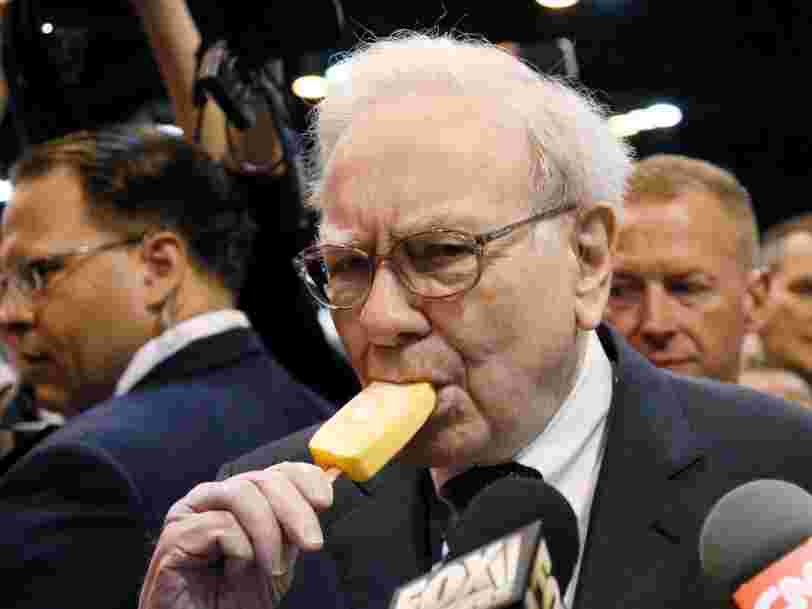Warren Buffett swapped stock for cocoa in the 1950s. Here's the story of the billionaire investor's chocolate arbitrage.
Theron Mohamed- Finance
-
Recevoir tous les articles sur ce sujet.
Vous suivez désormais les articles en lien avec ce sujet.
Voir mes sujets suivisCe thème a bien été retiré de votre compte

"The profits were good and my only expense was subway tokens," the famed investor and Berkshire Hathaway boss said.
- Warren Buffett took advantage of an arbitrage opportunity involving cocoa beans in 1954.
- Rockwood & Company, a chocolate maker led by Jay Pritzker, was buying back its shares in exchange for cocoa beans, as it wanted to capitalize on sky-high cocoa prices without incurring a huge tax bill.
- The future Berkshire Hathaway boss spent several weeks buying Rockwood shares, swapping them for cocoa beans, and selling the beans on a commodities exchange.
- "The profits were good and my only expense was subway tokens," Buffett told shareholders.
- Buffett and Pritzker crossed paths again when KKR acquired RJR Nabisco in the late 1980s, and Berkshire later bought Pritzker's holding company, Marmon.
Warren Buffett's greatest pleasures in life include chocolate and making money. The billionaire investor and Berkshire Hathaway CEO combined those two passions in 1954 - not by hoarding chocolate coins, but by taking advantage of an arbitrage opportunity involving cocoa beans.
Buffett was 24 at the time and had recently joined Graham-Newman, a New York investment fund cofounded by his mentor, Benjamin Graham. His bosses got wind of Rockwood & Company, a chocolate maker in Brooklyn, making an unusual offer to investors. They dispatched the young Buffett to Rockwood's shareholder meeting to learn more.
Jay Pritzker, a member of the powerful Pritzker family, was in charge of Rockwood. The price of cocoa beans had recently skyrocketed from 5 cents a pound to north of 60 cents, due to a temporary shortage, and Pritzker was eager to capitalize by selling Rockwood's excess inventory. However, a straightforward sale would incur an almost 50% tax on the proceeds, so the executive devised a clever way to escape the levy.
Pritzker explained to Buffett at the meeting that an "arcane provision" in the 1954 Tax Code was key to his plan, the Berkshire chief relayed in his 1988 and 2007 shareholder letters. The loophole allowed a company to avoid a tax hit if it distributed inventory among its shareholders as a result of narrowing the scope of its operations.
Following that rule, Rockwood stopped selling cocoa butter and assigned 13 million pounds of its cocoa-bean inventory to the discontinued business. The confectioner then offered to buy back its stock from investors in return for cocoa beans, at an exchange rate of 80 pounds per share. The repurchase program allowed it to leverage the elevated price of cocoa, avoid hefty taxes, and reduce its outstanding shares in the process.
However, Buffett realized that Rockwood was effectively selling its beans at a discount to the market price. He spent the next few weeks buying its shares, exchanging them for cocoa beans, and selling the beans on a commodities exchange.
"The profits were good and my only expense was subway tokens," Buffett said in his 1988 letter.
Buffett and Pritzker
Buffett was impressed by Pritzker's creative solution to Rockwood's problem, describing him as a "business genius" in his 2007 letter.
The two men crossed paths again when private-equity titan KKR acquired snack giant RJR Nabisco in the late 1980s. Berkshire boosted its stake in Nabisco to about 4 million shares after the deal was announced, then sold 3 million of them to KKR and the rest on the market, netting $64 million in pre-tax profits. Meanwhile, Pritzker was among a group of investors who waded into the bidding war for Nabisco.
"To quote Yogi Berra, 'It was deja vu all over again,'" Buffett said in his 1988 letter.
Berkshire later acquired Marmon, an industrial holding company founded by Pritzker and his brother. Buffett signed off on the $4.8 billion takeover - his largest-ever cash purchase at the time - on Christmas Day, 2007. Berkshire initially bought 64% of the business, then grew its stake to 100% by the end of 2013.
"The original corporation that is Marmon, I'm quite sure, is Rockwood & Company, which I did a cocoa arbitrage with back in 1955 or something, and that's where I met Jay Pritzker," Buffett said at Berkshire's shareholder meeting in 2014. "So these things wind their way along."
"One thing you learn in life, but also learn particularly in business, is that you're going to meet a lot of people and entities and have experiences in the future that you may have thought were one-stop shops originally in your life," he added.
When Buffett inquired about Pritzker's cocoa-for-stock program at Rockwood, he was only looking to make a quick buck. He could never have imagined that he was laying the groundwork for one of his future conglomerate's landmark deals.
Inscrivez-vous gratuitement à notre newsletter quotidienne
Via PakApNews